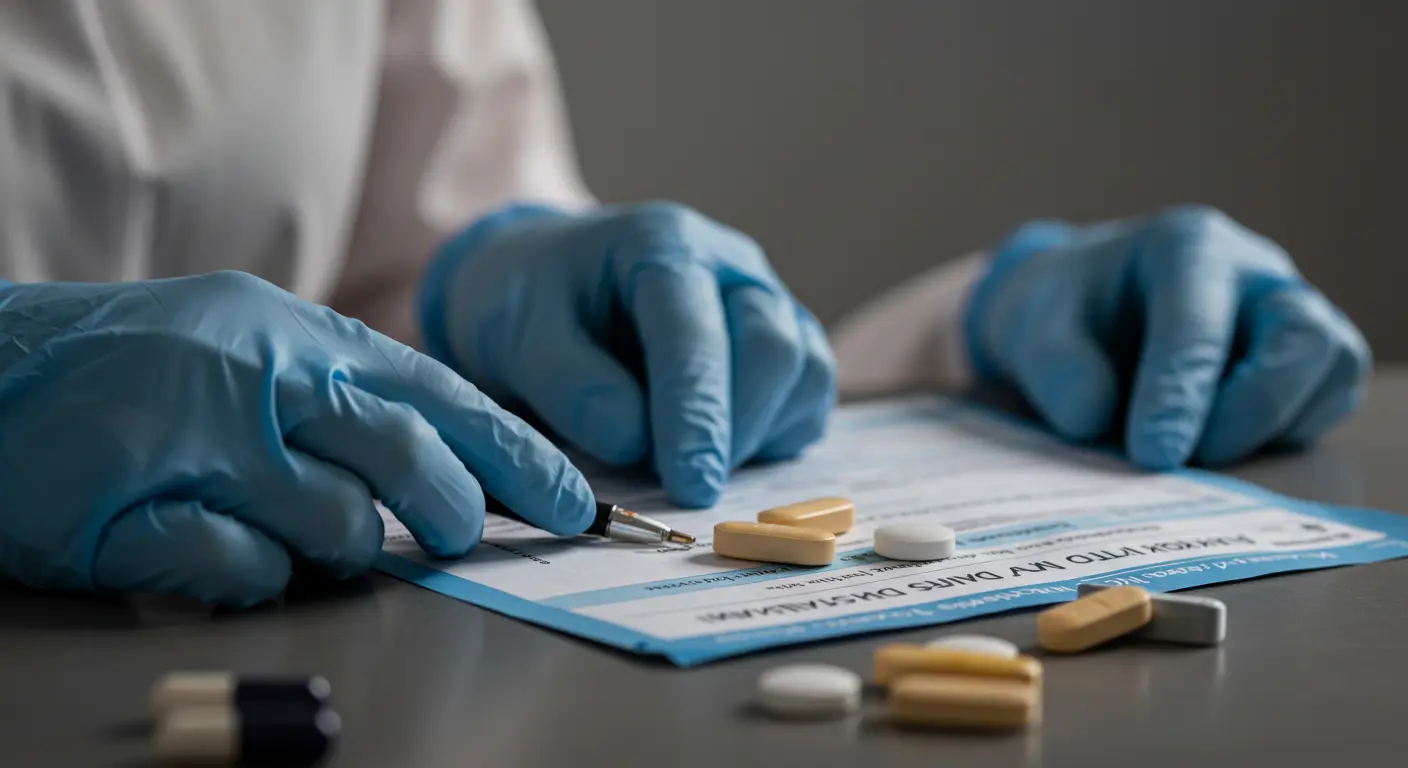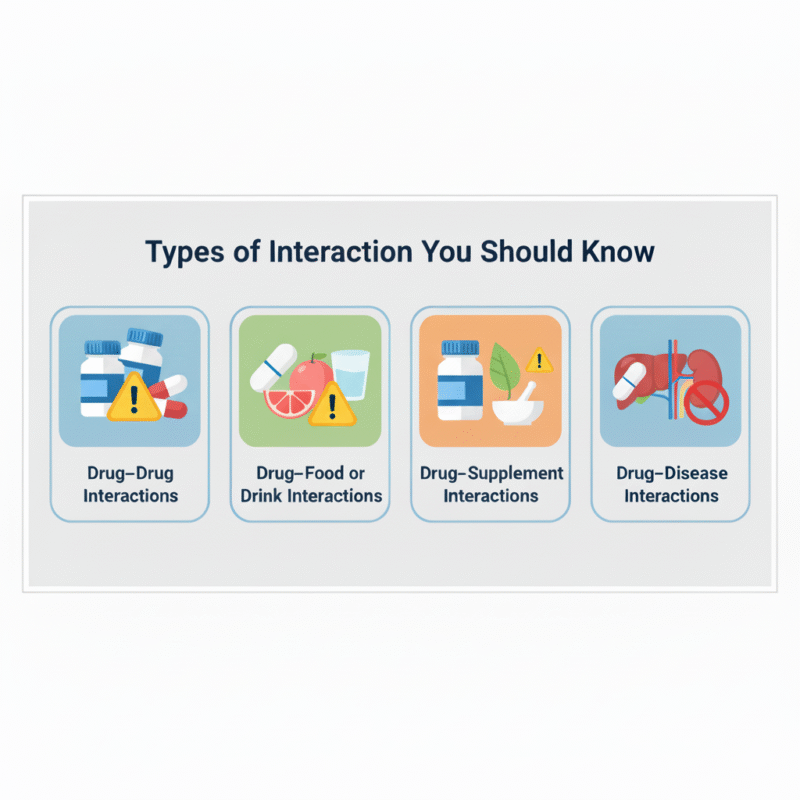Drug Interaction Checker – Avoid Risky Meds Mixes

Imagine you take a pill every morning, and your doctor prescribes a second one a month later. Then you begin using an over-the-counter remedy or a herbal supplement. Some days later you feel dizzy, nauseous, or worse.
Sometimes the culprit is not a new disease or diet it’s a drug interaction. Two (or more) substances in your body suddenly “talk” to each other in unexpected ways. That’s where a Drug Interaction Checker becomes your best friend.
I’ll walk you through what a drug interaction checker is, why it matters, how to use it wisely, and real tips (along with fresh insights) to help you avoid risky meds mixes.
What Exactly Is a Drug Interaction
A drug interaction happens when one substance (like a medicine, supplement, food or drink) changes the behavior of another. It might:
- Make the first drug stronger than intended (risking side effects).
- Make it weaker so it doesn’t work well.
- Give you a new unwanted side effect that neither would cause alone.
These interactions are not rare they can happen with prescription drugs, over-the-counter meds, vitamins, herbal supplements, even certain foods or drinks.
Types of Interaction You Should Know

To help you spot danger, here are the main categories:
- Drug Drug Interactions: Two or more medicines interfering with each other. For example, one might slow the clearance of another.
- Drug Food or Drug Drink Interactions: Certain foods or drinks affect how your body processes a drug. Grapefruit juice is a famous example.
- Drug Supplement (or Herbal) Interactions: Many people forget their “natural” remedies can interfere, too.
- Drug Disease Interactions: If you have kidney disease, liver disease, heart problems, interactions may worsen your condition.
Why Use a Drug Interaction Checker
If you thought avoiding interactions is only for doctors, think again. A drug interaction checker is your personal safety net. Here’s why:
Spot Hidden Dangers Early
Some interactions are subtle and may not be obvious until there’s damage. A checker tool spots conflicts before they hurt you.
Be Informed Before Seeing the Doctor
You can bring a list of flagged interactions to your provider and ask, “Do we need to change anything” That gives you more control.
Manage Complex Regimens
If you take several meds which is common among older adults or people with multiple conditions interaction risk increases. A checker helps manage that complexity.
Educate Yourself About Food, Supplements, and More
Many checkers include interactions with food, drinks, and supplements too things many blogs leave out or treat superficially.
Using a Drug Interaction Checker
Let’s go through a clear walkthrough of how to use a checker effectively, including tips to get accurate results.
List Everything You Take
Write down every medicine, over-the-counter (OTC) drug, vitamin, herbal supplement, and relevant food or drink you regularly consume. No omissions.
Find a Reliable Checker Tool
There are several out there. Some well-known ones:
- Drugs.com Drug Interaction Checker — pretty user friendly.
- Medscape Interaction Checker — used by clinicians, includes mechanisms.
- WebMD Interaction Checker — good for general audience.
- Hospital/health system checkers (e.g. from Brigham & Women’s).
Choose one; I’ll lean on general ones for demonstration.
Enter the Substances One by One
Input each drug or supplement. Many checkers let you add food or drink too.
Review the Results Carefully
You’ll usually see colored warnings or categorized levels like:
- Contraindicated
- Serious
- Monitor closely
- Minor
Look also at the explanation (why it’s risky). Good checkers show the mechanism (how one drug affects another).
Act Smart Don’t Panic
See a “serious” warning? That doesn’t always mean stop immediately. Instead:
- Consult your doctor or pharmacist.
- Ask if an alternative is safer.
- Possibly adjust timing (take one in morning, another later).
- Monitor for side effects.
Keep the Interaction List Updated
Each time you start a new medication (or stop one), re-run the check. Interactions change as your meds change.
Smart Tips to Avoid Risky Meds Mixes
These are not always covered well in competitor blogs, but they matter a lot.
Use One Pharmacy
If your prescriptions are all filled at the same pharmacy, the pharmacist is more likely to spot dangerous overlaps. Harvard’s tips also emphasize this.
Label Your Meds with Purpose
Add a note on each medicine (e.g. “for blood pressure,” “for sleep”). That helps when reviewing interactions, so you know why each drug is in your regimen. (Inspired by Harvard’s tip #1)
Be Skeptical of Supplements
Because they are less regulated, supplements often get less attention in interaction databases. Use checkers that include herbals or supplements. Monitor new research the SUPP.AI project showed gaps in our knowledge.
Don’t Forget Diet and Drinks
Even what you eat or drink during the day can matter. Grapefruit juice, dairy, caffeine sometimes they change absorption or metabolism. Use checkers that allow food/drink inputs.
Monitor Symptoms Closely After Changes
If your doctor adds or changes a medicine, for the first few days watch for anything unusual: dizziness, nausea, fainting, mood shifts. Early detection helps.
Keep a Drug List Card
Carry a card in your wallet listing your medicines, supplements, and allergies. Use that card when seeing any provider. It helps ensure the checker or your provider sees your full picture.
Re Check Regularly
Every time you change a dose, add a drug, or start a supplement run the interaction tool again. It’s not one-and-done.
Final Thought
A Drug Interaction Checker is not just a click on a website it’s a tool that helps you take control of your health. It fills in blind spots your medical team might miss (especially when supplements or food are involved). By following the steps above, staying updated, and combining checker results with professional input, you reduce risk significantly. Use this post as your reference not just once, but repeatedly, because health isn’t static, and neither is drug science.
